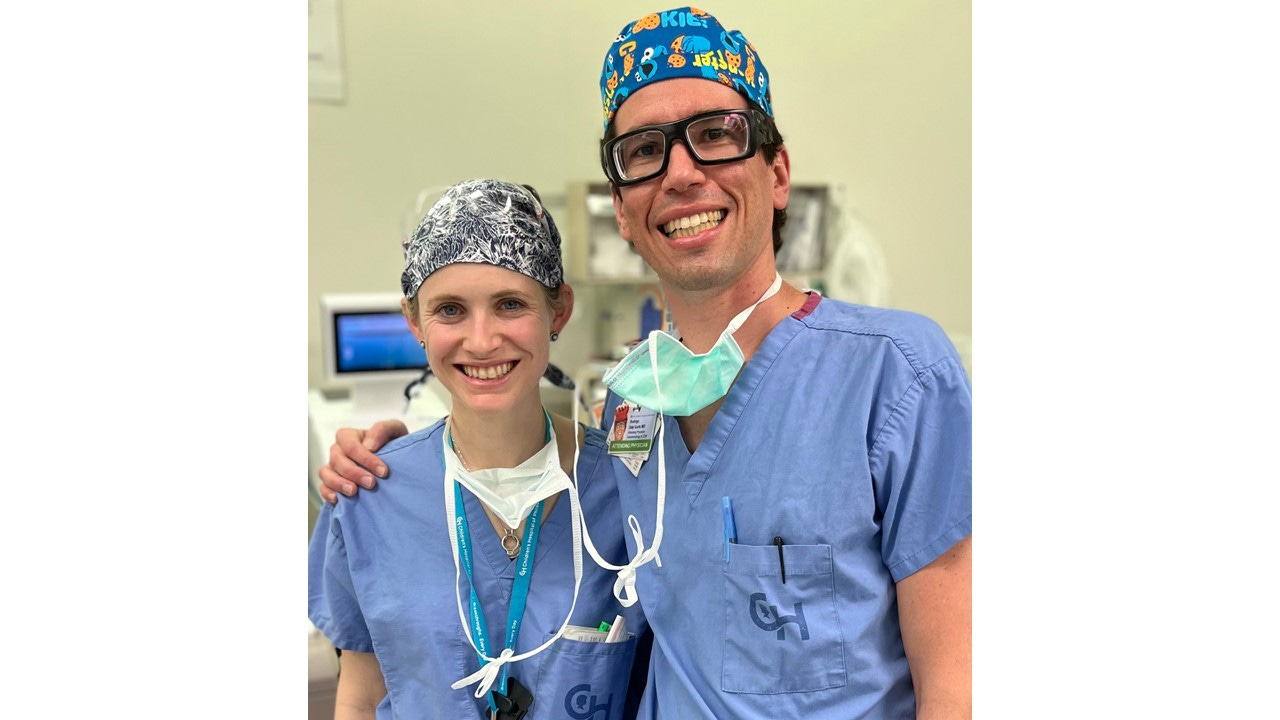Ron and Daphne 2020
It’s hard to believe but it’s been a year since Ron Litman’s death from leukemia. Ron started the PAAD during a brief window of recovery following his bone marrow transplant. He was an internationally known and respected medical educator, author, and clinician who spent most of his career at the Children’s Hospital of Philadelphia were he inspired and trained generations of pediatric anesthesiologists. “He loved to teach and mentor. That was his favorite thing to do,” said his wife, Daphne Klausner. That he stayed positive and productive even as he fought cancer was true to his nature. John Fiadjoe and I and the leadership of SPA have kept the PAAD going as a living tribute to him and his memory. Myron Yaster MD
From Jeff Feldman MD, Dean Kurth MD, and Daphne Klausner
In the November 12, 2021 PAAD, we announced the Ron Litman Endowed Mentorship Award: In today’s PAAD we announce the first winners.
Faculty: Rodrigo Daly-Guris, MD Mentee: Julia Hickey, MD
Faculty: Anushree Doshi, MD Mentee: Isabel Torres
“Thanks to the generosity of Ron’s family, the CHOP Department of Anesthesiology and Critical Care Medicine under the direction of Dean Kurth, and a number of individual donors, an endowed fund has been created which will provide up to $25,000 per year to a CHOP faculty member to support a mentored project. Academic projects in the areas of pediatric anesthesia, critical care, pain medicine and related fields are eligible for support. The selection process is competitive and this year we were fortunate to have four highly credible applications”.
We are pleased to announce the inaugural awards to two faculty mentors and their mentees and offer descriptions in their own words of their projects and the importance of the Litman award.
Faculty: Anushree Doshi, MD
Mentee: Isabel Torres
Project Title: Health Literacy in the Pediatric Perioperative Space
Our project aims to survey the health literacy of caregivers for pediatric perioperative patients. While there is growing literature in the pediatric and adult world about how gaps in health literacy translate to diminished access and engagement with the healthcare system, it is significantly understudied for our patient population. We hope to build on existing data to understand how much of our patient population is at risk, and if there are certain demographics that are associated with limited health literacy. We hope this work will be the foundation for targeting educational resources that will enhance health literacy. The Litman award support Isabel’s time this summer to pursue this work, as well as much needed statistical and data analysis. The award will also help finance the presentation of our findings at an upcoming conference. Isabel is an undergraduate at Thomas Jefferson University who has been a committed member of our departmental Diversity Equity and Inclusion group, and is hoping this project will be the springboard for future work in health equity as a graduate student.
Faculty: Rodrigo Daly-Guris, MD
Mentee: Julia Hickey, MD
Project Title: Airway Planning for Excellence (AirPlanE)
Current difficult airway algorithms focus on the technical aspects and sequence of steps one should follow. The American Society of Anesthesiologists 2022 Practice Guidelines for Management of the Difficult Airway made a positive step forward in mentioning the importance of human factors, but the extent to which these are discussed in the Guideline is limited to a list of human factors relevant to difficult airway management. There is mention of a “team-based approach” and the section on preparation for difficult airway management focuses on the availability of resources (equipment, a skilled clinician, physiologic monitoring, and oxygenation), but not on creating an individualized plan. The Difficult Airway Society (UK) guidelines, updated in 2015, exist as a series of steps, with tracheal intubation as the assumed primary plan. To our knowledge, there is no guidance or tool to assist with real-world integration of human factors principles in the practice of airway management. There is also a need for a robust briefing and planning framework that does not assume tracheal intubation to be the only correct primary approach and that incorporates by explicit design the creation of a team-centered philosophy. Our aim is to develop this tool, piloted in pediatric practice, but hopefully of utility in difficult airway management across the spectrum of age. This award will help fund attendance at the UPenn Implementation Science Institute for both Dr. Hickey and I. Ron was a friend, colleague, and outstanding mentor; I hope that I am able to adequately channel these qualities as I partner with up-and-coming clinician-scientists to address human factors considerations in the operating room.






